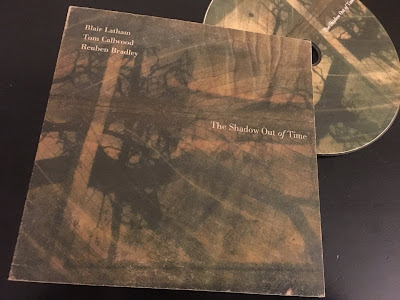Kim Paterson: Impending Journey (Tap Records)
Kim Paterson (trpt/flugel), Jason Jones (ts) Kevin Field and Mark de Clive-Lowe (p) Greg Tuohey (g) Cameron Undy and Kevin Haines (b) Nicholas McBride (d) Miguel Fuentes (percussion) 1997
As a new stage of my life begins, this month I have been checking out the very aptly named Impending Journey. A veteran of the NZ scene, Kim Paterson is somewhat under represented on record. In fact, Impending Journey was Paterson's first album as a leader. And outside of his work with Space Case and a couple of tracks on Jason Jones' Subspace, I have heard very little of Paterson’s playing, making this album a very welcome addition to the collection. Am I surprised that I can't recall him getting mentioned during my time in school?
This listening series must be starting to sink in as I immediately picked when Mark de Clive-Lowe was on piano. It's his rhythmic feel that stands out – more percussive than Kevin Field. Also, I thought “Tariqat” sounded like a piece Mike Nock would write – turns out he's the co-author along with Paterson, but I can't really put my finger on what the giveaway was though, just a gut reaction.
Back in 2001, Paterson talked about his love for latin music during and interview on Radio NZ's “Musical Chairs," and the presence of a number of Latin pieces here made a change for me. It's definitely a gap in my listening, and considering that I enjoy percussion it's a little odd that I still haven't delved into it that much at all. I think the bravado that often pops up in some of the music has put me off (although there is not much of that here). But I need to make more of an effort and I will probably get there eventually (recommendations appreciated!), but for now it remains on the back burner.
Although they bring a different mood to the album, the standard tunes almost seem out of place. I'm not sure if it's due the nature of playing as a duo, but I for me, I would have liked to hear more space on “Old Folks.” Both Paterson and Kevin Haines play in a pretty busy manner. On Horace Silver's “Peace” the group is stripped down to the trio of Paterson (on flugel) Tuohey and Undy. The lack of percussion leaps out and the guitar brings it's own color and texture into the mix, providing plenty of contrast to the four numbers that preceded it. The track grew on me a bit, but I found it lacked the forward momentum of the my favourite playing on the album. On more than one occasion, I ended up focusing on Undy's economical playing. The trio returns on “How Insensitive” and features some bold playing from Paterson (who is pretty busy here too), but I still feel things get a bit bogged down.
Jason Jones makes a welcome appearance on four tracks, and my initial impression was that he plays stronger here than on his own release, Subspace (but I probably need to go back and give it another listen). He never overplays his hand, paces himself well and plays some nice bold lines. I particularly enjoyed his well constructed solo on the title tune that features alternating swing and latin sections.
Paterson plays with plenty of energy, has a nice melodic sense and there’s some fire too, without overdoing it - around the 2 min mark on “Lost and Found.” Or on “Tariqat,” which features a nice mellow approach on flugelhorn but he adds some zip when he moves into the upper register. The muted trumpet lines stood out on “Miguel” – I think it was the urgency to his time feel that did it (and in general, I liked his time feel throughout the album). I really enjoyed Kevin Field's comping behind the trumpet too (and his brief solo is perhaps the most harmonically varied of the soloists) and the alternating grooves on the piece “Miguel” brought the piece to life. Not surprisingly Miguel Fuentes got a bit of room to stretch out too [side note: while I felt the trio tracks interrupted the flow of the album, it would have been great to hear a track featuring Paterson and Fuentes as a duo]. “Vision” is full of spark, energy, swagger and ebb and flow. It comes with bit of a mid-60s Miles vibe and it stood out to me. Mark de Clive-Lowe's spacious approach to comping behind Paterson really hits the spot. He builds into the piece, creating a nice dialogue between piano and horn. The album wraps up with Paterson playing solo muted trumpet. It's his take on "Gujarati Arti" and the intimate performance makes for a nice coda.
I think all that remains for me to pick up in the Tap Records catalog is Mark de Clive-Lowe’s Vision, which features many of the same personnel. But as far as Paterson goes, I want to get the live recording from the late 60s with Bernie McGann and the more recent, The Duenede.
The one year mark for this series is just around the corner so stay tuned for more as I try and keep it going. In the meantime, if you want to see Paterson in action, John Fenton uploaded a video from a gig from earlier in 2018.



